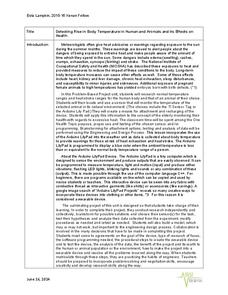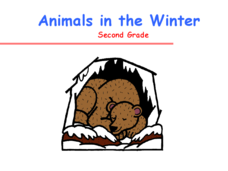Curated OER
Sea Animal Slide Show
Students cllassify sea animals into groups based on certain attributes. They create a picture on ClarisWorks for Kids. They write/wordprocess their own name and copy words from immediate environment to label sea animals.
K12 Reader
Competing for Resources
Young biologists examine the concept of scarce resources with a reading comprehension passage. After finishing the paragraphs, learners turn to the questions to demonstrate what they have learned about what is beneficial and what is...
Curated OER
Disguise for the Eyes
Young scientists discover how many, many animals use color as a way of helping them to survive in the wild. They understand how animals use color in their everyday lives. Pupils engage in hands-on activities, watch videos, access...
Curated OER
Learning to Resist: Watercolor
Consider wax resist drawings as a way to bridge art and science. Learners view, discuss, and practice drawing insects or animals using waxy crayons. They pay attention to the creature's features as they create images with watercolor and...
Curated OER
World of the Pond
Field trip! The class will review what they know about organisms that dwell in freshwater ponds, then trek down to the old water hole to collect specimens for examination. This includes several web links, useful tips, and an excellent...
Agriculture in the Classroom
Build it Better
If you think you can do better, feel free to give it a try. Pupils learn about the work on Temple Grandin and consider ways to improve animal handling facilities. They work in groups to build models to showcase their ideas.
Fluence Learning
Writing an Argument: The NIEHS
Should the work of the National Institute of Environmental Health Sciences be funded by the government? Middle schoolers weigh in on the status of federal funding for programs that protect the environment with three text passages and...
Kenan Fellows
Detecting Rise in Body Temperature in Human and Animals and its Effects on Health
Beat the heat using sensors. Scholars research normal body temperatures for humans and a specific animal. In groups, they create sensors that monitor body temperature, as well as the weather. The goal is to reduce the occurrence of heat...
Curated OER
What is Deforestation?
An overview of deforestation is the focus of this resource, which present the reader with a list of facts. Ten comprehension questions follow; learners can write their answers on a separate piece of paper. Have your environmental...
Curated OER
Sustainable Marine Fisheries
Through a fishing simulation, environmentalists discover consequences of over fishing. Afterward, they discuss how the activity relates to the impact of real-life commercial fishing. They also consider sustainability in the fishing...
Curated OER
Animals in the Winter: Second Grade
Ever wonder what animals do in winter? If your 2nd graders do then they will enjoy this PowerPoint. Each slide begins with a questions and then provides the answer, it is a short presentation but the resource links at the bottom make it...
Curated OER
Persuasive Writing-"Those Whales"
Use an article about an Orca killing a trainer to help writers complete a persuasive essay. The article, other templates, and models are attached. Scholars divide up into groups of three where each person takes a different role,...
Curated OER
Water in the Biosphere
Environmental explorers examine the campus and take note of living organisms. Introduce them to the biosphere and the questions of the day: How much water can be found in the biosphere? A slide show helps you along, and even contains a...
Chicago Botanic Garden
Unit 3 Pre-Test, Grades 7–9
Earth's systems respond to changes in environments in all types of ways including migration, extinction, adaptation, immigration, and emigration to name a few. Part one in a series of seven is a pre-test consisting of 14 questions. Some...
EngageNY
Grade 9 ELA Module 3, Unit 1, Lesson 3
To what extent can the surrounding environment influence one's behavior? Temple Grandin explores her connection to animals and her unique ability to understand their behavior with a lesson plan focusing on her book, Animals in...
Curated OER
Open Inquiry Using C. elegans
Ever wondered what motivates a roundworm? Introduce your biology class to C. elegans, a non-parasitic model organism that can help them understand behavioral stimuli. Paired pupils design an experiment to test the worm's reaction to...
Alabama Wildlife Federation
Itsy Bitsy Spider
Bring the outside in to make observations in a controlled environment. Pupils learn about predator-prey relationships with spiders firsthand. They first construct a spider habitat and then feed the spider insects to make observations...
Curated OER
Mapping Animal Behavior
Young scholars discuss the value of sampling in science. They, in groups, map cricket movement in response to various stimuli and graph their results.
Curated OER
Animals Word Search Puzzle
To make the classic word search more challenging and academic, this animal-terms puzzle has scholars solving clues to determine the words they find. Fifteen clues give detailed definitions of biology terms such as carnivore, reptile,...
Curated OER
Biology of Bats
Your class will love exploring animal conservation through this lesson on bats. Learners discuss the importance of bats in the ecosystem and talk about the different types and their characteristics. As a follow up, a model of a bat or a...
Curated OER
Animals and Engineering
Students study animal classification and their interactions. In this animals and engineering instructional activity students study animal communities and how engineers use this knowledge to create new technologies.
Curated OER
Exploring Ecosystems
Students examine the relationships between plants, animals, and the environment in ecosystems. They sort animal cards, collect natural materials from the schoolyard, and record an ecosystem web in the form of a poster.
Curated OER
Wild Dog Urine
Students investigate biology by researching wild animals. For this animal extinction lesson, students research African wild dogs and discuss the impact of the environment on their survival. Students read and analyze an article titled...
Curated OER
Life is Weird
Separate your science class into small groups and assign each a specific deep-sea organism to research. The class will learn about all of the organisms as each group presents their assigned animal. Following their presentations, you can...

























